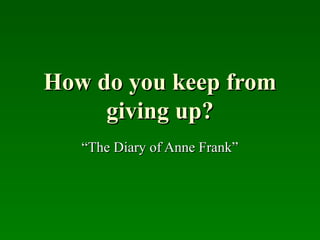
Agree or disagree
- 1. How do you keep from giving up? “The Diary of Anne Frank”
- 2. Agree? Somewhat…? Disagree? After reading each statement, decide whether you: Agree Somewhat agree/disagree Disagree Be ready to discuss your decision.
- 3. Agree? Somewhat…? Disagree? I treat all groups of people the same way.
- 4. Agree? Somewhat…? Disagree? I don’t hate anyone.
- 5. Agree? Somewhat…? Disagree? I would risk my life for my family.
- 6. Agree? Somewhat…? Disagree? I would risk my life for my friends
- 7. Agree? Somewhat…? Disagree? I would risk my life for a stranger.
- 8. Agree? Somewhat…? Disagree? I get angry when I am not treated fairly.
- 9. Agree? Somewhat…? Disagree? If it hadn’t been for Hitler, the Holocaust would never have happened.
- 10. Agree? Somewhat…? Disagree? What is done cannot be undone, but one can prevent it from happening again.
- 11. Agree? Somewhat…? Disagree? It is okay to ignore things that are wrong if they don’t affect you directly.
- 12. Agree? Somewhat…? Disagree? In spite of everything, people are really good at heart.
- 13. What are the consequences of silence? “In Germany, they came first for the communists, and I didn’t speak up because I was not a communist. Then, they came for the Jews and I didn’t speak up because I was not a Jew. Then, they came for the trade unionists, and I didn’t speak up because I was not a trade unionist. Then, they came for the Catholics, and I didn’t speak up because I was a Protestant. Then, they came for me and by that time, no one was left of speak up.” -Pastor Martin Niemoller
- 14. Holocaust Pre-reading Imagine that you and your family had to go into hiding in order to survive and avoid being separated from each other. Express how you feel about leaving your home and friends.
- 15. Holocaust Pre-reading During hiding, your very survival is dependant on the goodness and charity of others. Would you be willing to risk your life for someone you hardly know, understanding that if you are caught, you will be put to death?
- 16. Elements of Drama: Basic Dramatic Principles Exposition (Background Information) introduces the characters, setting, and basic situation Initial Conflict struggle, main problem Complications (Rising Action) disagreements, additional problems Climax moment of greatest interest or suspense; the turning point Denouement (Resolution) how the play ends (final act)
- 17. Elements of Drama Act and Scene: Dramas are divided into acts and scenes. Acts and scenes are important because they organize and add dramatic emphasis to a story. In live performance you can identify a scene by a brief break in the story or blackout on the stage. Breaks between acts are much longer and often present major changes when the story resumes. Act A major division of a drama that usually focuses on one piece of the plot or theme of the play. Acts are divided into scenes (similar to chapters in a book). Scene Presents action in one place or situation.
- 18. Elements of Drama Stage Directions: Stage directions are the instructions written into the script of a play that describe the characters, sets, costumes, and lighting. They give the readers insight into what the author intends for the visual aspects of settings and specific actions. Stage directions appear in italics offset by brackets.
- 19. Elements of Drama Irony: occurs when there is a difference between what is expected and what actually happens in a short story, poem, or play. Situational irony An author creates situational irony when a character expects a particular outcome, but the opposite occurs. Dramatic irony An author creates dramatic irony when the reader or audience has important information that the character or characters do not have. For example, dramatic irony may result when a character lacks self- awareness and acts according to false ideas. How is the play, “The Diary of Anne Frank” an example of dramatic irony? We (audience/readers) know that Anne and the others will not survive.
- 20. Elements of Drama Flashback: An interruption in the present action to show events that happened at an earlier time.
- 21. Characters in Crisis (Conflict): Every play centers on a crisis, a situation of danger or difficulty that places something of great value at risk: life, love, family, and pride, anything that is precious to them. The crisis may arise because the characters want something for which they must struggle with someone else (external conflict) or with themselves (internal conflict). The crisis may also arise because the characters want to remove a threat to their safety or happiness. Character cannot avoid the situation and must stay and face the threat = external conflict Character chooses to avoid the threat = internal conflict
- 22. Making a Change (Characterization): Most plays are about change, both in characters and in their relationships. In The Diary of Anne Frank both dynamic and static characters exist. These changes come about as the characters work out their conflicts. In The Diary of Anne Frank, we see several of the characters change as a result, some becoming wiser and more generous, others pettier and more self-centered.
